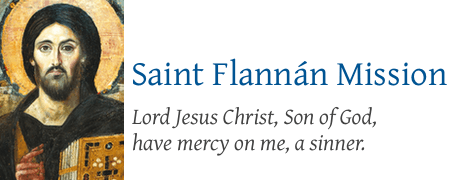In the Name of the Father and of the Son and of the Holy Spirit, one God. Amen. Dear beloved, in the Week of the Publican and Pharisee, let us commemorate the Translation of the Holy Relics of Father among the saints, Saint John Chrysostom, one of the great teachers of the Church. This coming Sunday is also the Synaxis of the Three Holy Hierarchs Saint Basil the Great, Saint Gregory the theologian, and Saint John Chrysostom. May the fathers among the saints, Saint Basil, Saint Gregory, Saint John Chrysostom, pray for us!
Saint John Chrysostom met an untimely death in 407 AD. During a Divine Liturgy at Hagia Sophia, Patriarch of Constantinople Saint Proclus, disciple of St John, sang praises of the departed saint, “O John, your life was filled with sorrow, but your death was glorious. Your grave is blessed and reward is great, by the grace and mercy of our Lord Jesus Christ O graced one, having conquered the bounds of time and place! Love has conquered space, unforgetting memory has annihilated the limits, and place does not hinder the miracles of the saint.”
When Saint Proclus said that, the people were so moved that they asked the St Proclus to intercede with the emperor to allow the holy relics of Saint John Chrysostom be brought back to Constantinople. The emperor was touched by the sincerity of Saint Proclus and gave an order to transfer the relics of Saint John Chrysostom.
However, nobody could lift the holy relics. The emperor then realized that he gave an order, rather than a prayer. So the emperor wrote a petition to the reposed Saint John, asking for the saint’s forgiveness. When the emperor’s petition was read out, the people could lift the holy relics of Saint John and moved them to Constantinople. When Saint Proclus opened the coffin, he saw the incorrupt body of Saint John. The emperor saw the incorrupt body of Saint John and cried to the reposed saint, asking for forgiveness for his own mother who exiled the saint.
In the morning, when the people brought the saint’s coffin to the Church of the Holy Apostles, they cried to St John Chrysostom, “Father, take up your throne!” Then Saint Proclus and the people saw St John’s incorrupt body open his mouth and declare, “Peace be to all”. Many sick people were healed.
Let us remember that God has infinite mercy on all of us who profess our faith in humility and repentance (Isaiah 26:4-8). It is also about us allowing the mercy and grace of God to heal us. It is participation (Psalm 40:1-4).
As a Christian, prayer is a definitive component. As Saint Ephraim the Syrian said, “Blessed is he who prays with fervor, for the devil never approaches him”.
What is the Christian prayer?
There are 5 kinds of prayers – Lamentations, Requests, Gratitude, Praises, and Dialog.
A dialog with God can be silent, listening, lifting our minds and hearts to God, to be aware of His Holy Name and all that He shows to us in the world around us. While the first 4 kinds of prayers are common, let us remember that it is the 5th kind of prayer, dialog, that draws us closest to Him. When we pray in a dialog with God, let it be about God, and about others whose needs outweigh ours.
The Desert Fathers said, “What is pure prayer? Pure prayer is brief in words but abundant in actions. For if your actions do not exceed your petitions, then your prayers are mere words.” (St Matthew 6:5-15, St John 14-17).
Therefore, it is about our repentance, our humility, our deeds, and our journeys. It is not about a laborious petition that goes on and on. That would be mere words. St Tikhon of Zadonsk said that we can always pray to God in our hearts, “Lord have mercy”.
In a modern world full of false prophets and demons that will tempt us astray, let us remember that only Christ is our center (John 10:9-16, Hebrews 7:26-8:2).
Let us call upon the Holy Name of Christ our Lord and Savior often, such as what the Fathers before us taught, “Lord Jesus Christ, Son of God, have mercy on me, a sinner”.
Let us close by praying the thanksgiving prayer:
It is truly meet to call thee blest, the Theotokos, ever blessed and most pure, and the Mother of our God. More honorable than the Cherubim, and more glorious than the Seraphim, without corruption thou gavest birth to God the Word: True Theotokos, we magnify thee.
O virgin Theotokos, rejoice; O Mary full of grace, the Lord is with thee. Blessed art thou among women, and blessed is the fruit of thy womb, for thou hast borne the Savior of our souls, Jesus Christ our Lord. Amen.
Fr Raphael+
Readings
Isaiah 26:4-8
Psalm 40:1-4
John 10:9-16
Hebrews 7:26-8:2

